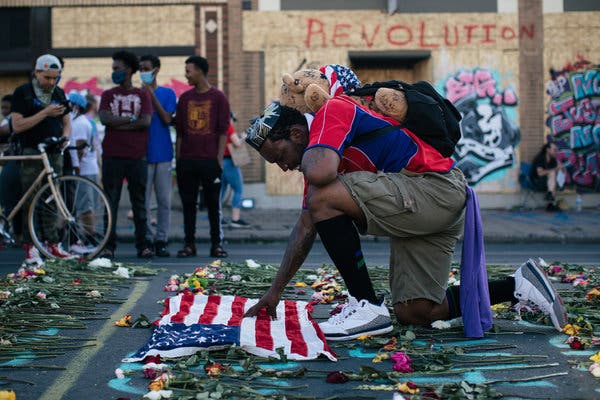
WASHINGTON — Defense Secretary Mark T. Esper said Sunday that President Trump ordered a withdrawal of American forces from northern Syria, a decision that will effectively cede control of the area to the Syrian government and Russia, and could allow a resurgence of the Islamic State.
Mr. Esper, appearing on both Fox News and CBS News, said that American troops, mostly Special Operations forces, would leave the northeastern part of the country in the face of Turkey’s incursion into the section of Syria controlled by Kurdish forces, a group of fighters trained and backed by the United States government.
The Pentagon has slow-walked previous orders by Mr. Trump to evacuate from Syria, to protect its Kurdish partners and hold the ground it took back from the Islamic State. But Mr. Esper’s comments Sunday indicated that this time Mr. Trump’s drawdown order was being acted on with haste.
The bulk of the roughly 1,000 troops in Syria are positioned in the northeastern part of the country. The new orders will remove the troops from that area, sending them, at least initially, to Iraq. For now the Pentagon will leave the Special Operations forces in southern Syria in place. Military officials said plans remained fluid, and commanders would be watching the situation closely over the next three days. But in any case, the implications were clear: American forces will not be coming to the aid of their Kurdish allies in the face of the Turkish-backed offensive.
Appearing on “Fox News Sunday,” Mr. Esper defended the planned withdrawal of what he said was “less than 1,000 troops” as prioritizing the safety of American soldiers in the crisis, and he said the United States would ultimately have been unable to deter Turkey from invading Syria.
“Fifty service members are not going to stop a Turkish advance,” Mr. Esper said, referring to the “trip wire” force along the Turkish border that Mr. Trump ordered removed last week. “The U.S. doesn’t have the forces on hand to stop an invasion of Turkey that is 15,000 strong.”
Mr. Esper said the Pentagon expected Turkish forces to annex even more territory than originally estimated. He also confirmed that the commander of the Kurdish-led Syrian Democratic Forces was “cutting a deal” with Russian and Syrian government forces who are now heading north to fight back against the Turkish offensive.
The announcement came amid a wave of intense criticism from both parties over the pullout.
Representative Adam Kinzinger, an Illinois Republican who served in Iraq as an Air Force pilot, said that the withdrawal of American troops from Syria was “going to be terrible,” and that the president was putting national security at risk.
“The Kurds found out on Twitter, for goodness’ sakes,” Mr. Kinzinger said on CBS’s “Face The Nation.” “We have left them to the wolves. And the message this is sending to our allies around the world, I think, is really going to be bad.”
Representative Eliot L. Engel, Democrat of New York and the chairman of the House Foreign Affairs Committee, called for the House to pass his bipartisan legislation to condemn Mr. Trump’s Syria policy and impose sanctions on Turkey. The measure is co-sponsored by the top Republican on the panel, Representative Michael McCaul of Texas.
“I can think of nothing more disgusting in all the years I’ve been in Congress than what this president is allowing to happen to the Kurds,” Mr. Engel said on NBC’s “Meet the Press,” adding, “This is going to make people flee from us, and it’s just absolutely disgraceful that the president of the United States is facilitating all of this.”
Mr. Trump took to Twitter to defend the pullout, calling it “very smart not to be involved” in the fighting, and to try to mollify his critics, expressing openness to imposing sanctions on Turkey. But the denunciations piled up on Sunday, coming even from military officials who are usually allies of the administration.
“Shame: while Kurds are slaughtered US military in full retreat in eastern Syria,” tweeted Jack Keane, a retired Army vice chief of staff who has been close to the Trump White House. “Giving up control of airspace enables Turk invasion.”
Throughout the fight with the Islamic State that began in 2014, the Kurdish forces proved to be America’s most able partners. But Turkey has long viewed those forces as an offshoot of what it and the United States consider a terrorist group it has long battled inside its borders and throughout the region.
The Kurdish forces were key to breaking the Islamic State’s control of territory in Syria, effectively destroying its self-proclaimed caliphate. Despite Mr. Trump’s claim that the Islamic State is defeated, the fighters remain an effective insurgent force in Syria and Iraq. If the Turkish incursion into Syria breaks the power of the Kurdish force, some military officials believe the Islamic State could once again find lawless safe havens from which to rebuild.
American military forces pulled out of Ain Issa, a Syrian town north of the Islamic State’s former self-declared capital of Raqqa, on Sunday morning after an advance of the Free Syrian Army, a rebel group backed by Turkey, according to American military officials.
The remaining Special Operations forces are working out of about a dozen bases or outposts in northeastern Syria. One of the most important of those is Manbij, where nearly 200 American forces are based. That base is the most likely to be evacuated next.
Turkish officials have long objected to Kurdish control of Manbij. Ankara has repeatedly said it wants Kurdish forces to withdraw from Manbij, and give control to its Syrian Arab allies.
American military officials do not believe Turkey will be able to effectively control any territory it moves into, and believe that its offensive is likely simply to allow the Syrian regime, backed by Russia, to effectively retake control of the country.
The United States also maintains a small contingent of troops at the Al-Tanf base in south-central Syria, as a deterrent to Iranian movements in that region. The withdrawal order will not affect that post, an American official said.
The garrison at Al-Tanf, for now, is viewed as critical to protect Jordan and to counter Iranian influence, and Mr. Trump has not pushed for any withdrawal from there. Some former officials have made the case to Mr. Trump and Jared Kushner, his son-in-law and adviser on the Middle East, that Al-Tanf is critical for protecting Israel as well.
Defense officials emphasized that their plans for Syria remained fluid. During the next couple of days, American commanders in the region and at the Pentagon will assess options on which forces should withdraw, in which order and where. Some may withdraw to Iraq or Jordan, and others could go back to the United States or Europe. The Air Force will continue to provide air cover for the military troops that are withdrawing.
The withdrawal from northeastern Syria is expected to be complete perhaps as early as the end of October, a military official said. But the pace of the withdrawal will depend on how quickly Turkish-backed forces advance.
Some defense officials are worried that American forces could be targeted by Turkish-backed forces or other groups while they are withdrawing. Military officials warned that any attacks would be met with strong counterstrikes, to deter any miscalculation by other forces.
Mr. Engel said the United States should consider trying to kick Turkey out of NATO, calling President Recep Tayyip Erdogan “a bad guy.”
“I think it’s something that needs to be considered,” he said. “How do you have a NATO ally who’s in cahoots with the Russians?”
Chris Cameron and Sheryl Gay Stolberg contributed reporting.


